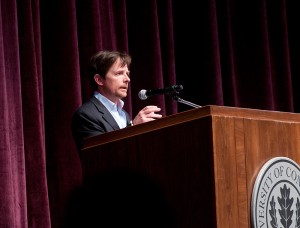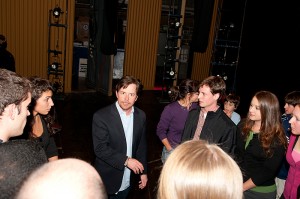
It started with a shaking pinky. Speaking to a packed audience at the Jorgensen Center for the Performing Arts this past Wednesday, actor-turned-activist Michael J. Fox was recalling the moment that he first discovered signs of early onset Parkinson’s disease.
He was staying at a hotel, and awoke to find that his little finger had a slight, persistent tremor. Initial curiosity soon turned to dread, Fox remembered, as he realized that he couldn’t stop the shaking.
Since that incident 20 years ago, Fox, best known for his acting in the Back to the Future movie trilogy, has cris-crossed the nation as an advocate for a cure for Parkinson’s disease, a degenerative disorder of the central nervous system that impairs motor skills and other functions.
In a lecture titled, Always Looking Up: The Adventures of an Incurable Optimist, Fox spoke about his childhood, his family, and his decision to become an actor. Recalling his early acting career, tiny first apartment, and infrequent meals he said, “Being a poor, starving actor, is a lot more fun in retrospect.”
Drawing on lessons learned during his acting career, Fox shared meaningful insights on how he has learned to cope with his affliction. When faced with tragedy, he stressed, don’t play the result. Instead, live life to the fullest by living through the moment.
“There’s a saying in acting,” Fox noted, “especially in comedy: ‘Never play the result.’
“If you’re about to, say, get a pie in the face, you can’t flinch because you know the pie is coming,” he explained. “If you do, the joke falls flat and the moment is ruined.” Then, with emphasis, Fox added: “You have to live through that moment as if you didn’t know what was going to happen – as if you were really living through the moment.”
Fox related how – after being diagnosed with Parkinson’s disease – he went through denial and the “rest of the stages,” referring to the five stages of grief that Elisabeth Kubler-Ross identified in her 1969 book On Death and Dying.
“It was like I was standing in the middle of a street wearing cement shoes,” said Fox. “I could hear the bus, I knew the bus was coming, I could literally feel its vibrations, but I didn’t know whether it was an uptown bus or a downtown bus, or when it was going to get here or what damage it was going to do.”
Crediting the help and understanding of his family and friends, Fox said that he eventually came to terms with his illness and the trajectory it would take. “I was still me,” he said. “I was just me with Parkinson’s disease.”

Choosing to be pro-active, Fox established the Michael J. Fox Foundation for Parkinson’s Research, an organization with the mission of funding research that may one day lead to better treatments and a cure for Parkinson’s disease. A part of his work for the Foundation includes speaking engagements around the country that Fox takes on annually, using his celebrity status to help educate audiences about the disease.
Throughout the lecture, Fox repeatedly spoke about the importance of living in the moment, about living life to the fullest, and about not playing the result.
He recalled a woman he met one day who was worried that her husband was in denial about having Parkinson’s Disease. Asking her in what way her husband was in denial, she replied that he was pursuing activities that he just shouldn’t be doing anymore: hiking, jogging, golfing, and traveling. Fox remembers thinking: “That’s not denial lady, that’s life.”
“Life comes down to a series of choices,” he said. “One choice I can’t make is whether or not I have Parkinson’s disease. Everything else is up to me.”
The event was co-sponsored by the Student Union Board of Governors (SUBOG) and the Connecticut Leadership Legacy Experience. SUBOG is a student-run program that hosts a number of events each semester, ranging from major music concerts, to comedians, to speakers. The Leadership Legacy Experience has been established to recognize and invite the University’s most exceptional student leaders to participate in a year-long leadership enhancement experience that builds on their legacy as University leaders and helps prepare them for a life of commitment and contribution beyond graduation.


